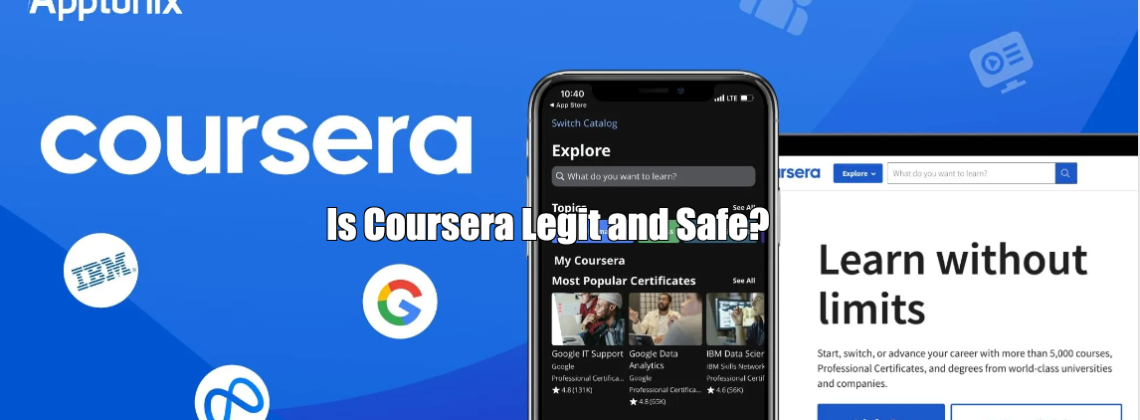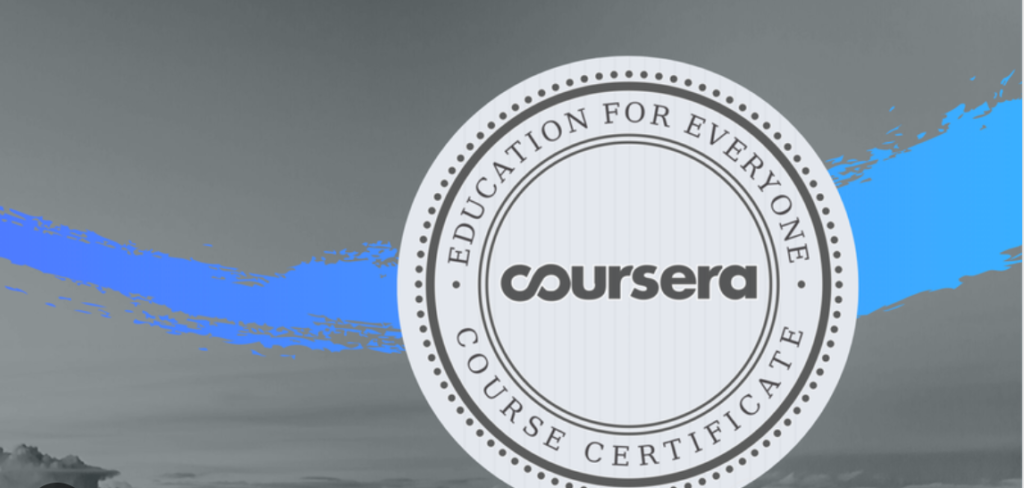
Is Coursera Legit and Safe?
Summary
Pros
-
Reputable Partnerships:
Coursera partners with top universities and companies like Yale, Stanford, Google, and IBM. This means the courses are designed by experts and are of high quality. -
Accredited Certifications:
Many courses offer certifications recognized by employers, which can help boost your resume and career prospects. Some programs even offer university credits. -
Positive Reviews:
Many learners have shared positive experiences, praising the course quality and flexibility, which adds to Coursera’s credibility. -
Data Security:
Coursera uses encryption and strict privacy policies to protect users’ personal information, ensuring that your data is safe. -
Secure Payments:
The platform offers secure payment options, such as credit cards and PayPal, making financial transactions safe. -
Transparent Policies:
Coursera provides clear information about courses, pricing, and refunds, which helps users make informed decisions. -
Diverse Course Selection:
With courses in subjects ranging from technology to humanities, there is something for everyone. -
Financial Aid:
Coursera offers financial aid and scholarships for learners who need assistance, making education more accessible.
Cons
- Course Quality Variability:
Not all courses are of the same quality. Some may be less engaging or informative, but reviews and ratings can help you choose wisely. - Costs:
While auditing courses is often free, getting a certificate or accessing graded assignments usually requires a fee, which might be a barrier for some. - Completion Rates:
Online learning can be challenging, requiring self-discipline. Some learners may struggle to finish courses without a set schedule. - Limited Interaction:
Unlike traditional classrooms, interaction with instructors can be limited, which might not suit everyone. - Internet Access Required:
A reliable internet connection is necessary to access course materials and participate in online activities.
Coursera is an online learning platform that was founded in 2012 by two Stanford University professors, Daphne Koller and Andrew Ng. The platform partners with top universities and organizations worldwide to offer courses, specializations, and degrees in a variety of subjects. Coursera has millions of learners across the globe, making it one of the most popular e-learning platforms. But what makes Coursera legit and safe compared to other platforms? In this review, we will explore the features, benefits, and security measures of Coursera to help you decide whether it is a trustworthy platform for learning.
Why Coursera is Legit
One of the primary reasons Coursera is considered legit is its partnerships with reputable institutions. The platform collaborates with over 200 universities and companies, including Yale, Stanford, Google, and IBM. This collaboration ensures that the courses offered are of high quality and are designed by experts in their respective fields.
Accredited Certifications
Many courses on Coursera offer certifications that are recognized by employers worldwide. These certifications can help learners enhance their resumes and improve their career prospects. Some programs even offer university credit, making it easier for learners to pursue further education. This level of recognition and accreditation demonstrates that Coursera is not a scam, but a legitimate learning platform.
Positive Reviews and Testimonials
Coursera has received numerous positive reviews from learners who have benefited from the platform. Many users have praised Coursera for its diverse course offerings, flexible learning schedules, and the quality of instruction. These testimonials further establish Coursera’s legitimacy as a trusted online learning provider.
Is Coursera Safe?
Safety is a major concern for anyone using an online platform. When it comes to Coursera, users often ask, “Is Coursera safe?” Here are some reasons why Coursera is considered a safe platform for online learning.
Data Security and Privacy
Coursera takes data security and privacy seriously. The platform uses encryption to protect users’ personal information and employs strict privacy policies to ensure that data is handled responsibly. This focus on security reassures users that Coursera is safe for storing their personal information and completing online transactions.
Secure Payment Options
When enrolling in courses or paying for certifications, users want to know that their financial information is secure. Coursera offers secure payment options, including credit card payments and PayPal, ensuring that transactions are safe from fraud. This level of security is another reason why Coursera is not a scam.
Transparent Policies
Coursera’s transparency in its policies and terms of service further supports its legitimacy. The platform provides clear information about course content, pricing, and refund policies, allowing users to make informed decisions. This transparency is a hallmark of a trustworthy and safe platform.
Potential Concerns and How Coursera Addresses Them
While Coursera is largely considered legit and safe, some users may still have concerns. Here are a few potential issues and how Coursera addresses them:
Course Quality
Not all courses on Coursera are created equal. Some learners may find certain courses to be less engaging or not as informative as expected. To address this, Coursera allows users to leave reviews and ratings for courses, helping prospective learners make informed decisions. Additionally, Coursera continuously updates and improves its course offerings based on user feedback.
Cost and Accessibility
While many courses on Coursera are free to audit, obtaining a certification or accessing graded assignments often requires a fee. This cost can be a barrier for some learners. However, Coursera offers financial aid and scholarships for those who cannot afford the fees, making education accessible to a broader audience.
Completion Rates
Online learning requires self-discipline and motivation, and some users may struggle to complete courses. Coursera combats this issue by offering flexible deadlines, interactive content, and community support to keep learners engaged and motivated.
How to Make the Most of Coursera
To ensure you have a positive experience with Coursera, here are some tips:
- Set Clear Goals: Before starting a course, define what you want to achieve. Whether it’s learning a new skill or earning a certification, having clear goals will keep you motivated.
- Choose the Right Course: Take the time to read course descriptions, reviews, and ratings. This research will help you choose a course that meets your needs and expectations.
- Stay Organized: Create a study schedule that fits your lifestyle. Consistency is key to successfully completing online courses.
- Engage with the Community: Participate in discussion forums and connect with other learners. This interaction can enhance your learning experience and provide valuable support.
- Take Advantage of Resources: Coursera offers various resources, such as video lectures, reading materials, and quizzes. Utilize these resources to deepen your understanding of the subject.
Coursera vs. Other Platforms
When comparing Coursera to other online learning platforms, several factors make it stand out:
- Quality of Content: Coursera’s partnerships with top universities ensure high-quality course content.
- Accredited Certifications: Many platforms offer courses, but Coursera’s certifications are widely recognized by employers.
- Diverse Course Offerings: From business to technology to arts, Coursera covers a wide range of subjects.
- Flexibility: Coursera’s self-paced courses allow learners to study on their own schedule.
- Financial Aid: Coursera’s financial aid program makes education accessible to a diverse audience.

Variety Of Certificates at Coursera
Because Coursera has a variety of learning options, it is only natural for it to offer different certificates.
Coursera offers a variety of certificates, including:
- Course certificates are issued to students who have successfully completed an individual course.
- Certificates of completion are awarded to students who have completed a program that is deemed as a Professional Certificate.
- MasterTrack certificates. They are awarded for courses completed within a MasterTrack Program and can be used as credit towards a master’s program at the partner institution.
- Graduation Certificates. A certificate awarded to graduates of Graduate Certificate programs. These certifications are highly valued in academic and professional circles.
- A postgraduate diploma. The official degree issued by the institution in question. It is possible to receive a copy during an official convocation together with students who studied there.
- Certificates of University. The certificates issued by universities prove you have earned the degree in question.
Also read: Is Booksi Legit and Safe? Its Travel & Vacations Guide!
Conclusion: Is Coursera Legit and Safe?
After examining the features, benefits, and security measures of Coursera, it is clear that Coursera is legit and safe. Its partnerships with reputable institutions, commitment to data security, and transparent policies demonstrate that it is not a scam. While there are potential concerns, Coursera addresses these issues effectively, ensuring a positive learning experience for its users.
Whether you are looking to learn a new skill, earn a certification, or advance your career, Coursera offers a legitimate and safe platform to achieve your goals. By setting clear objectives, choosing the right courses, and staying motivated, you can make the most of your learning journey on Coursera.
In a world where online scams are prevalent, Coursera stands out as a trustworthy and reliable option for learners worldwide. So, if you’re wondering, “Is Coursera legit?” rest assured that Coursera is a legitimate and safe platform that can help you reach your educational and career aspirations.


